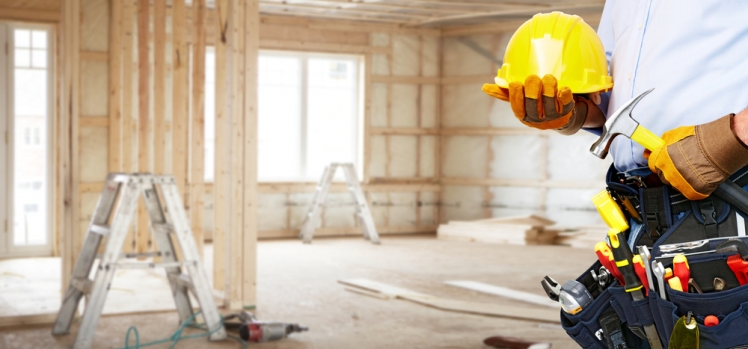Are you planning a home renovation or building project in Naperville? Choosing the right home contractor in Naperville is crucial to ensure quality work and reliability. With so many options available, finding the perfect contractor can feel overwhelming. But fear not! This guide will help you navigate the selection process and make an informed decision.
When it comes to selecting a home contractor in Naperville, it’s important to consider their experience, expertise, and reputation. Look for contractors who have a proven track record of delivering high-quality projects on time and within budget. Don’t forget to check their certifications and licenses to ensure they meet industry standards.
In addition to experience and credentials, it’s important to find a contractor who understands your vision and communicates effectively. A good contractor will listen to your needs, provide suggestions, and keep you updated throughout the project.
Whether you’re looking for a contractor for a small renovation or a complete home construction, this guide will provide you with the tips and insights you need to make the right choice. Don’t settle for anything less than excellence when it comes to your home – choose a contractor that is committed to delivering top-notch quality and reliability.
Researching Home Contractors in Naperville
Contents
When searching for a home contractor in Naperville, it’s essential to do your due diligence. Researching potential contractors will help you narrow down your options and find the best fit for your project. Here are some steps you can take to conduct a thorough research:
- Ask for recommendations: Start by asking friends, family, and neighbors for recommendations. Personal referrals can be a great way to find trustworthy contractors who have already proven their worth. Ask about their experiences and whether they would recommend the contractor.
- Check online directories: Utilize online directories and review websites to find a list of contractors in Naperville. Websites like Angie’s List, HomeAdvisor, and Houzz can provide you with a wealth of information, including customer reviews, ratings, and portfolios of previous work.
- Visit contractor websites: Once you have a list of potential contractors, visit their websites to gather more information. Look for details about their services, experience, and areas of expertise. A professional and informative website can indicate a contractor’s commitment to quality and professionalism.
- Look for affiliations and certifications: Check if the contractor is affiliated with professional organizations such as the National Association of Home Builders (NAHB) or the National Association of the Remodeling Industry (NARI). These affiliations demonstrate a commitment to industry standards and continuous education.
- Consider local contractors: Choosing a local contractor can have several advantages. Local contractors are familiar with the local building codes and regulations, have established relationships with suppliers, and are more accessible for ongoing communication and site visits.
Remember to take notes and create a shortlist of home contractor Elmhurst that stand out to you. This will make it easier to compare and evaluate them later on.
Checking for Licensing and Insurance
Before hiring a home contractor in Naperville, it’s crucial to verify their licensing and insurance. Working with a licensed and insured contractor ensures that you are protected in case of any accidents, damage, or subpar work. Here’s what you should look for:
- Check for a valid license: In Illinois, contractors are required to have a license issued by the Illinois Department of Financial and Professional Regulation (IDFPR). You can verify a contractor’s license online through the IDFPR website. Ensure that the license is valid and up to date.
- Confirm insurance coverage: Ask the contractor for proof of insurance coverage. They should have both general liability insurance and workers’ compensation insurance. General liability insurance protects you from any property damage or injuries that may occur during the project. Workers’ compensation insurance covers any injuries sustained by workers on your property.
- Bonding requirements: Depending on the scope and value of your project, you may also want to consider contractors who are bonded. A contractor’s bond provides financial protection in case the contractor fails to complete the project or fulfill their contractual obligations.
- Subcontractor insurance: If the contractor plans to hire subcontractors for specific tasks, ensure that they have insurance coverage as well. Subcontractors should have their own liability and workers’ compensation insurance to protect you from potential liabilities.
Always ask for copies of licenses and insurance certificates, and verify their authenticity with the respective issuing authorities. Don’t be afraid to ask questions and seek clarification if anything seems unclear.
Reading Customer Reviews and Testimonials
One of the best ways to gauge the quality and reliability of a home contractor is by reading customer reviews and testimonials. Reviews provide valuable insights into the experiences of past clients and can help you determine if the contractor is a good fit for your project. Here’s how to effectively evaluate customer reviews:
- Look for consistency: Read multiple reviews to get a balanced perspective. Look for consistent themes or patterns in the reviews. If multiple clients mention the contractor’s excellent communication skills or attention to detail, it’s likely that these qualities are a genuine reflection of their work.
- Consider the overall rating: Pay attention to the overall rating of the contractor. While a few negative reviews are not uncommon, it’s essential to consider the overall sentiment expressed by the majority of clients. A high overall rating indicates a higher likelihood of a positive experience.
- Evaluate the level of detail: Reviews that provide specific details about the project, timeline, and communication can be more reliable than generic reviews. Look for reviews that mention the contractor’s ability to meet deadlines, stay within budget, and address any issues that arise.
- Check for responsiveness: If the contractor responds to reviews, take note of their level of engagement. A contractor who takes the time to respond to both positive and negative feedback shows a commitment to customer satisfaction and resolving any concerns promptly.
Remember that while reviews can be helpful, they should not be the sole determining factor in your decision. Use them as a guide, but also consider other factors such as experience, credentials, and personal interactions with the contractor.
Asking for References
In addition to reading customer reviews, asking for references from past clients can provide you with a more comprehensive understanding of the contractor’s work. References allow you to directly speak with individuals who have firsthand experience working with the contractor. Here’s how to effectively ask for and evaluate references:
- Request a list of references: Ask the contractor for a list of references, including past clients who have had similar projects to yours. A reputable contractor should be willing to provide references without hesitation. If they are hesitant or unable to provide references, it may be a red flag.
- Contact the references: Reach out to the references provided and ask specific questions about their experience working with the contractor. Ask about the quality of work, adherence to timelines, communication, and any issues that may have arisen. Take note of their responses and any concerns or praises they express.
- Visit completed projects: If possible, ask the contractor if you can visit a completed project similar to yours. Seeing the contractor’s work firsthand can give you a better idea of the quality and attention to detail. Pay attention to the craftsmanship, finishes, and overall aesthetics of the completed project.
- Consider the contractor’s response: After speaking with the references, consider how the contractor responds to your inquiries. Are they open and transparent about the references? Do they provide additional references if needed? A contractor who is confident in their work and has positive references should be willing to share them.
By reaching out to references, you can gain valuable insights into the contractor’s work ethic, professionalism, and ability to deliver on their promises. This information can help you make a more informed decision.
Comparing Estimates and Contracts
Once you have narrowed down your choices to a few contractors, it’s time to compare estimates and contracts. The estimates and contracts will outline the scope of work, timeline, costs, and other important details of the project. Here’s how to effectively compare and evaluate estimates and contracts:
- Request detailed estimates: Ask each contractor for a detailed estimate that breaks down the costs of materials, labor, permits, and any other expenses. The estimate should also include the estimated timeline for the project. Ensure that the estimates are thorough and clearly outline what is included and excluded from the project.
- Evaluate the level of detail: Compare the level of detail provided in each estimate. A comprehensive estimate that includes specific materials, quantities, and finishes is a good indicator of a contractor’s attention to detail. Look for any discrepancies or inconsistencies among the estimates.
- Consider the overall cost: While cost should not be the sole determining factor, it’s important to consider the overall cost of the project. Remember that quality work comes at a price, and significantly lower estimates may indicate a compromise in materials or workmanship. Choose a contractor who offers a fair and competitive price without sacrificing quality.
- Review the contract: Carefully review the contract provided by each contractor. Ensure that it includes all the details discussed during the estimation process, including the scope of work, payment schedule, warranty information, and any special provisions or contingencies. If anything seems unclear or ambiguous, seek clarification from the contractor.
- Consider the contractor’s responsiveness: Pay attention to how responsive and approachable the contractor is during the estimation and contract review process. A contractor who promptly addresses your concerns and is willing to make necessary revisions to the contract demonstrates a commitment to clear communication and client satisfaction.
Comparing estimates and contracts can help you identify any discrepancies or potential issues before the project begins. Take your time to carefully review and understand the terms and conditions outlined in each contract to avoid any misunderstandings or disputes later on.
Verifying the Contractor’s Experience and Expertise
Before making a final decision, it’s crucial to verify the home contractor in Naperville experience and expertise in handling projects similar to yours. Here’s how to assess their experience and expertise effectively:
- Ask for a portfolio of previous work: Request a portfolio of the contractor’s previous projects, especially those that are similar in scope to your project. Review the portfolio to assess the quality of workmanship, attention to detail, and overall design aesthetics. Look for projects that align with your vision and requirements.
- Inquire about their team and subcontractors: Ask about the contractor’s team and whether they use subcontractors for specific tasks. A well-established contractor should have a reliable team of skilled professionals and subcontractors who specialize in different areas. Ensure that the contractor has experience managing subcontractors and maintaining quality control throughout the project.
- Ask about ongoing education and certifications: Inquire about the contractor’s commitment to ongoing education and professional development. A reputable contractor will stay updated with the latest industry trends, techniques, and building codes. Certifications and affiliations with professional organizations can also indicate a contractor’s dedication to maintaining high standards.
- Discuss your project in detail: Schedule a meeting with the contractor to discuss your project in detail. Use this opportunity to gauge their level of interest, understanding, and enthusiasm for your project. A contractor who asks thoughtful questions and provides suggestions based on their expertise demonstrates a genuine interest in delivering the best results.
- Consider the communication style: Effective communication is essential throughout the project. Evaluate the contractor’s communication style during your interactions. Do they listen attentively to your needs and concerns? Do they provide clear explanations and updates? Choose a contractor who communicates effectively and keeps you informed every step of the way.
By verifying the home contractor in Naperville experience and expertise, you can ensure that they have the necessary skills and knowledge to successfully complete your project. A contractor with a proven track record and a passion for their craft is more likely to deliver the quality and reliability you seek.
Choosing the right home contractor in Naperville requires careful research, evaluation, and consideration of various factors. Take the time to research potential contractors, check for licensing and insurance, read customer reviews and testimonials, ask for references, compare estimates and contracts, and verify the contractor’s experience and expertise. By following this guide, you can make an informed decision and choose a contractor who is committed to delivering top-notch quality and reliability. Remember, your home is your sanctuary, so don’t settle for anything less than excellence.


